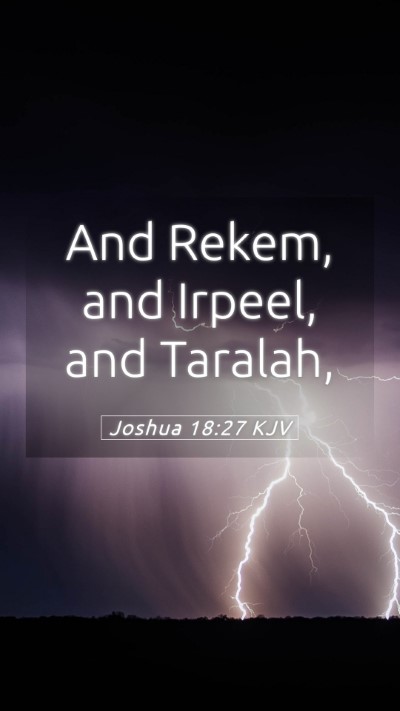Bible Verse Commentary: Joshua 18:27
Verse: Joshua 18:27 (KJV): "And Zelah, Eleph, and Jebus, which is Jerusalem, and Gibeath, and Kirjath; fourteen cities with their villages. This is the inheritance of the children of Benjamin according to their families."
Understanding the Context
The Book of Joshua describes the Israelites' entry into the Promised Land and the subsequent division of the land among the tribes. The passage in Joshua 18:27 concludes the record of the cities allocated to the tribe of Benjamin. This verse signifies the completion of the land distribution and highlights the importance of geographical and tribal boundaries in the context of Israel's identity and heritage.
Bible Verse Meanings and Interpretations
According to various public domain commentaries, including those by Matthew Henry, Albert Barnes, and Adam Clarke, Joshua 18:27 provides insights into:
- Historical Significance: The mention of cities like Jerusalem (Jebus) underlines the historical and spiritual importance of Jerusalem as the future capital of Israel. It reflects the central role Jerusalem would play in Jewish worship and governance.
- Covenantal Promises: The allocation of land is a tangible fulfillment of God’s promises to Abraham, Isaac, and Jacob, cementing the relationship between God and the Israelites.
- Tribal Identity: The list of cities portrays the boundaries and identity of the tribe of Benjamin, reinforcing their unique role within the nation of Israel.
Key Themes in Joshua 18:27
Several essential themes emerge when examining Joshua 18:27 from various scholarly perspectives:
- Faithfulness to God's Promises: The completion of land distribution illustrates God's faithfulness in keeping His covenant.
- Community and Belonging: The specific enumeration of cities fosters a sense of belonging and purpose among the tribe members.
- Legacy and Heritage: The cities symbolize both a physical and spiritual inheritance for the people of Benjamin, encouraging contemporary readers to consider their own spiritual heritage.
Historical Context
The cities mentioned in Joshua 18:27 were historically significant. Jebus (Jerusalem) would eventually become the heart of Jewish worship and the site of Solomon's Temple. Understanding the historical context of these cities aids in comprehending their significance in Biblical narrative and prophecy.
Application of the Verse
The modern reader can glean several applications from Joshua 18:27:
- Recognizing God’s Faithfulness: Reflect on the ways God has fulfilled promises in your own life.
- Understanding Community: Appreciate the importance of community and belonging in one’s faith journey.
- Embracing Heritage: Recognize and value the spiritual heritage passed down through generations.
Bible Cross References
This verse connects to several other passages that enrich its understanding:
- Genesis 15:18-21: God’s promise of land to Abraham.
- Joshua 18:11-14: The initial description of the territory of Benjamin.
- 1 Chronicles 12:10: Acknowledgment of the tribes and their contributions.
Concluding Thoughts
In summary, Joshua 18:27 is a pivotal verse that encapsulates the themes of divine faithfulness, the significance of land and identity for the people of Israel, and the importance of understanding our spiritual heritage. By analyzing this scripture, we gain deeper insights into God's promises, the structure of Israelite society, and applicable lessons for our own lives. This makes it an excellent subject for Bible study groups, online Bible study resources, and individual reflection.


